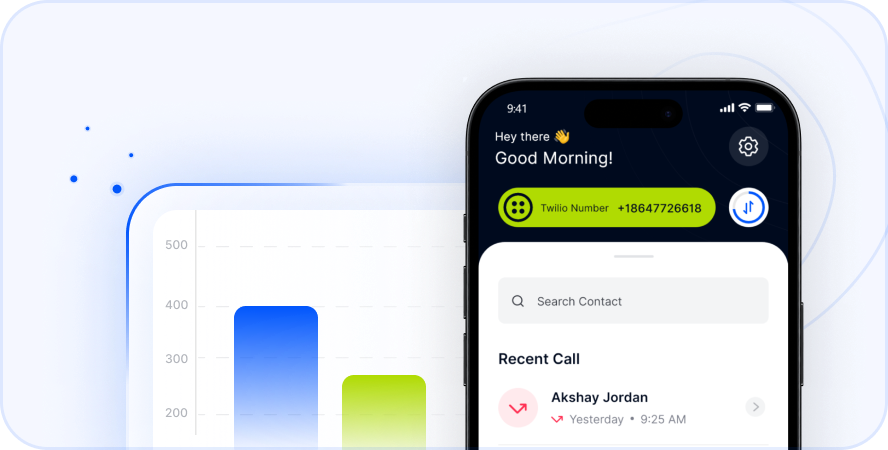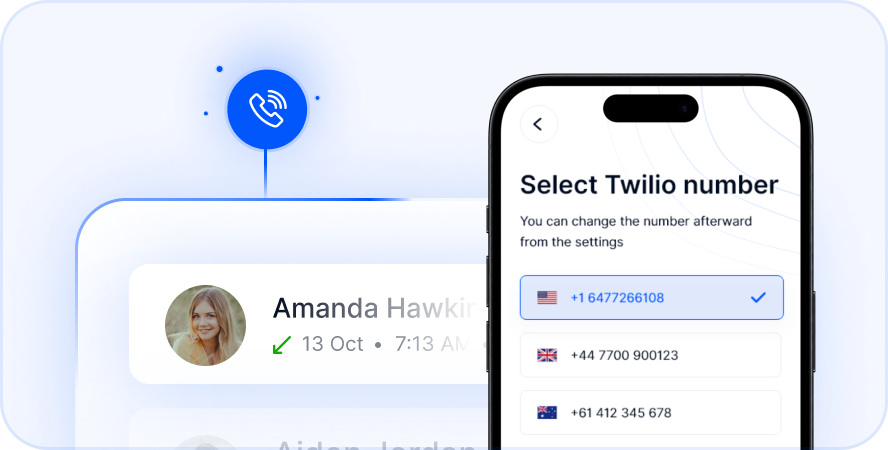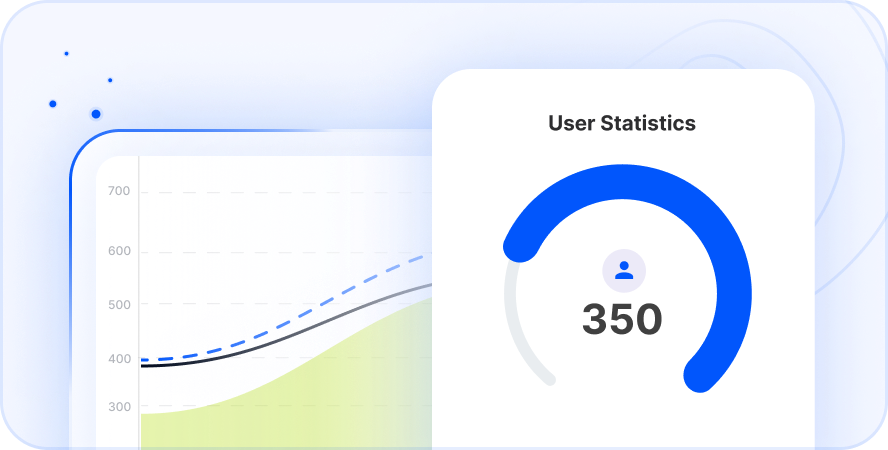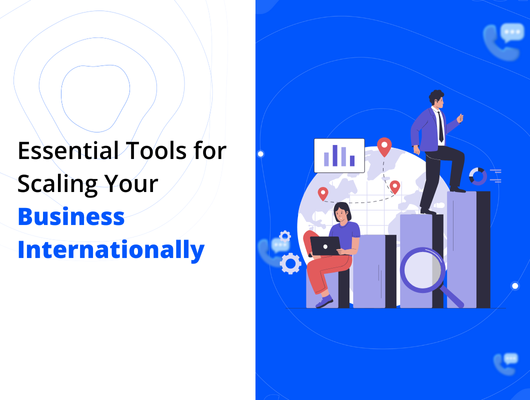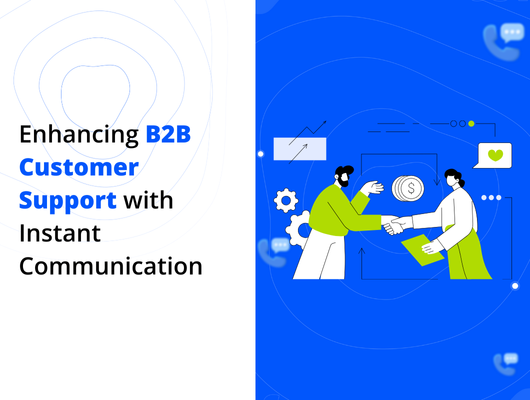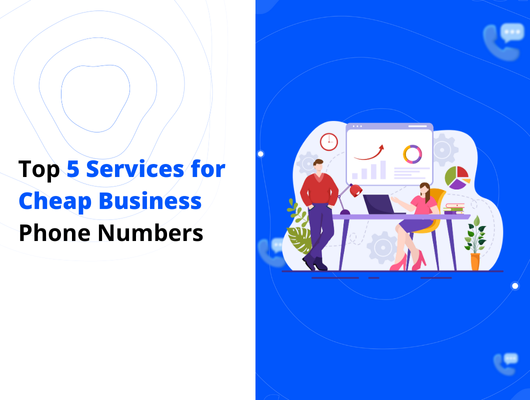
Effective communication is the backbone of any successful sales effort. This is especially true when your business operates across different parts of the world. Trying to reach potential customers, close deals, and build relationships across varied time zones, languages, and communication channels can be a significant hurdle. Whether you are connecting with clients in New York, London, or Sydney, your sales team needs the right tools. These tools enhance sales calling efficiency, streamline daily tasks, and help keep costs under control. Research shows that improving communication can directly impact your bottom line. According to a study by McKinsey, companies with better internal communication are 25% more likely to report increased productivity. The right communication tools are no longer a luxury; they are essential for global sales success.(Read)
This is precisely where modern cloud-based virtual phone systems come into play. They provide businesses with a powerful solution for global communication challenges. Unlike traditional phone lines, these systems offer a wide array of advanced features. Furthermore, they bring unmatched cost-effectiveness. This ensures that businesses can easily scale their sales operations without spending too much money. Such systems empower sales teams to connect more effectively, regardless of location.
The Vital Role of Efficient Sales Communication
Sales calling remains one of the most direct ways to engage with prospects and customers. However, it can also be one of the most demanding parts of the sales process, both in terms of time and expense. Whether you are actively seeking new leads, following up on previous conversations, or handling customer questions, being efficient in this area is crucial. Efficiency drives higher conversion rates and supports overall revenue growth.
Improving sales calling efficiency involves more than just increasing the number of calls a salesperson makes each day. It requires a strategic approach. This includes leveraging appropriate technology, optimizing existing processes, and enhancing communication channels. The goal is to ensure that every single call is valuable and delivers results while remaining cost-effective. Ultimately, efficient sales calls lead to stronger connections and better outcomes.
Why Sales Efficiency Matters in Today’s Market
In today’s fast-paced business environment, efficiency directly translates to competitiveness. An efficient sales team can reach more qualified leads, respond faster to inquiries, and manage their pipeline more effectively. This directly impacts the speed at which deals move through the sales cycle. Quicker cycles mean faster revenue generation.
Moreover, efficient sales calls often lead to better customer experiences. When a salesperson is well-equipped and their process is smooth, they can focus more on the conversation itself. They can better understand the customer’s needs and provide more relevant solutions. This improved interaction builds trust and strengthens customer relationships, which is vital for long-term business success and repeat business.
Measuring and Improving Sales Call Performance
To enhance efficiency, you first need to understand how your sales calls are performing. Key metrics provide valuable insights. These include call volume, call duration, connection rates, conversion rates (from call to meeting or call to close), and follow-up time. Analyzing these numbers helps identify bottlenecks and areas for improvement.
Technology plays a significant role in tracking these metrics. Modern sales communication tools often come with built-in analytics dashboards. These tools gather data automatically, providing clear reports. By regularly reviewing this data, sales managers can provide targeted coaching to their team members. They can also refine scripts, optimize call timing, and adjust strategies to boost overall team performance and efficiency.
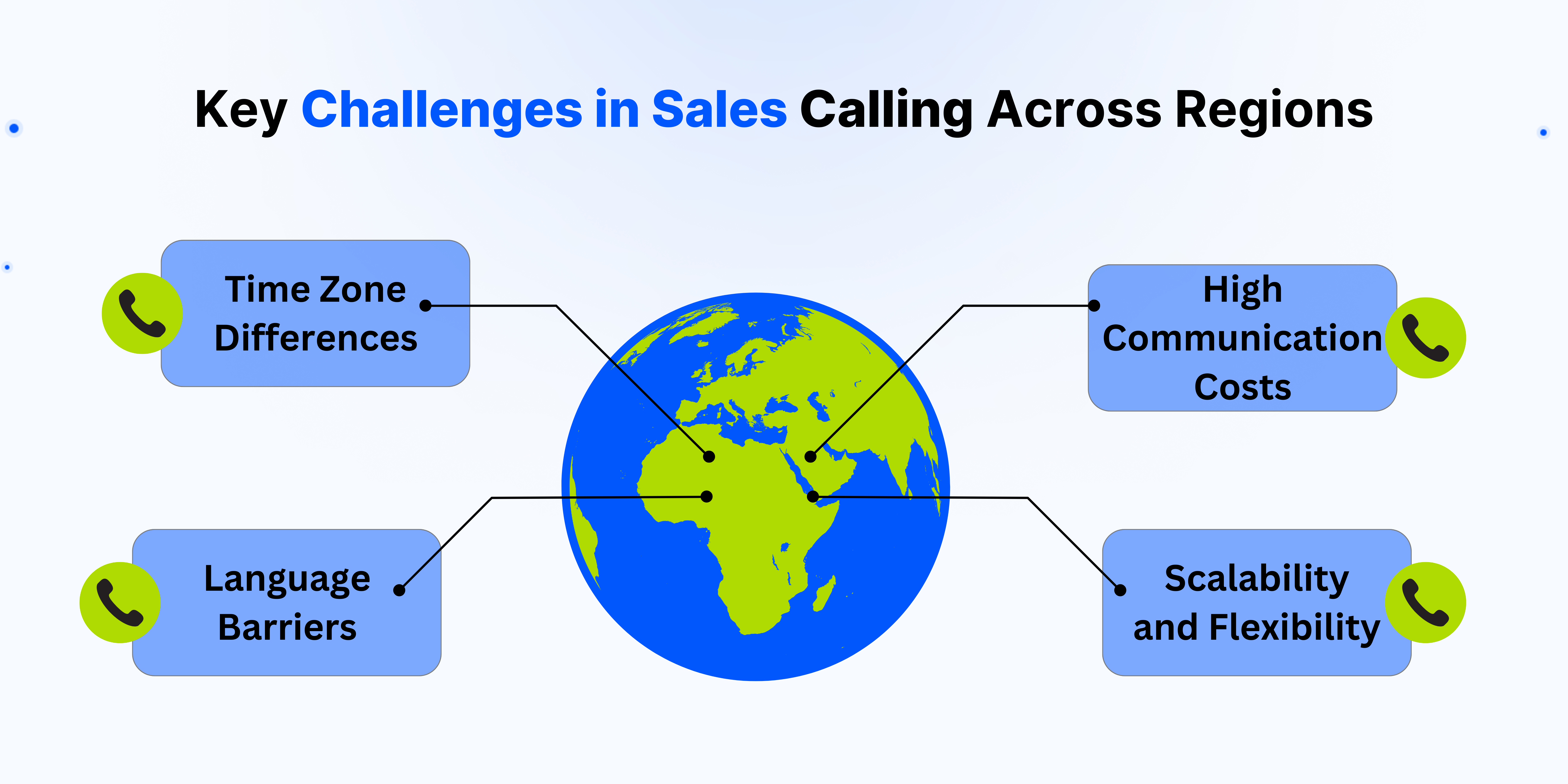
Overcoming Global Hurdles: Challenges in Cross-Region Sales Calls
Expanding your sales reach globally opens up exciting opportunities. However, it also introduces a unique set of challenges. These obstacles can slow down your sales process and reduce your team’s effectiveness if they are not managed properly. Understanding these key challenges is the first step toward finding effective solutions.
Sales teams engaging with international prospects often face complexities that their local counterparts do not. These can impact everything from initial contact to closing the deal. Identifying these specific hurdles helps businesses choose the right tools and implement the best strategies to overcome them. Addressing these challenges head-on ensures smoother operations and higher success rates in global markets.
Navigating Time Zones for Effective Outreach
One of the most significant challenges when selling globally is managing time zone differences. Trying to schedule calls with clients located hours ahead or behind your team can be incredibly difficult. This often leads to calls happening at inconvenient times for either the salesperson or the prospect.
Poor time zone management results in missed connections, delayed responses, and frustration for everyone involved. It can also reduce the number of productive calls a salesperson can make each day. Without tools that help visualize and manage schedules across different regions, sales teams waste valuable time coordinating calls instead of having them.
Breaking Down Language and Cultural Barriers
Communication effectiveness is vital in sales. Language barriers can make this difficult when dealing with international prospects. Misunderstandings can arise easily, complex information can be lost in translation, and building rapport becomes harder. Simply speaking the same language isn’t always enough; cultural nuances also play a role in how messages are received.
Without proper support, salespeople may feel ill-equipped to connect genuinely with clients from diverse linguistic backgrounds. This can lead to lower engagement rates and a reduced likelihood of converting leads. Providing resources or tools that help bridge these gaps is essential for global sales teams.
Managing the Costs of International Engagement
Traditional phone lines and international calling services can be surprisingly expensive. Making frequent calls to different countries often comes with high per-minute charges and unpredictable bills. These costs can quickly add up, especially for businesses making a large volume of international sales calls.
High communication costs can impact a business’s budget and may even limit how often sales teams can afford to reach out to international leads. This financial burden can act as a barrier to global expansion. Finding a cost-effective solution is crucial for sustainable growth in international markets.
Scaling Your Sales Operations Globally
As a business grows and expands its international sales efforts, managing a large volume of calls across numerous regions becomes a significant logistical challenge. A small team using basic tools may quickly become overwhelmed. This leads to inefficiencies, dropped leads, and missed opportunities.
Scaling requires a communication system that can handle increased call traffic without sacrificing quality or becoming prohibitively expensive. It also needs features that support a growing, potentially distributed, sales team. Without a scalable infrastructure, businesses can find their growth potential limited by their communication capabilities.
How Smart Communication Tools Transform Sales Calls
Technology has fundamentally changed how businesses connect with customers. Modern communication tools, particularly cloud-based VoIP systems, offer powerful solutions to the challenges faced by global sales teams. VoIP, or Voice over Internet Protocol, allows calls to be made over the internet rather than traditional phone lines. This technology provides flexibility and advanced features previously unavailable.
Implementing a smart communication system like a cloud phone system can significantly improve sales calling efficiency. It addresses many of the hurdles discussed earlier, making it easier and more affordable to connect with prospects worldwide. These tools don’t just facilitate calls; they enhance the entire sales communication workflow.
1. Cost Savings and Global Reach
One of the biggest advantages of VoIP solutions is the significant reduction in international calling costs. Since calls travel over the internet, the per-minute rates are often much lower than those charged by traditional carriers. This makes frequent global communication much more affordable.
Cloud phone systems enable businesses to connect with contacts in virtually any country without incurring massive expenses. This allows sales teams to broaden their reach and pursue opportunities in markets that might have been too costly to engage with previously. The savings can be substantial, freeing up budget for other sales activities.
2. Streamlining Workflows with Seamless Integration
Efficient sales work is often about reducing manual tasks and having all the necessary information in one place. Many smart communication tools offer seamless integration with popular Customer Relationship Management (CRM) systems and other sales platforms. This integration is a game-changer for efficiency.
With integrated tools, sales teams can make calls directly from their CRM interface. Call details, notes, and recordings are automatically logged against the contact record. This eliminates the need for manual data entry, saving time and ensuring accuracy. A unified dashboard simplifies managing calls, customer data, and sales activities.
3. Bridging Communication Gaps
Addressing language and cultural barriers is critical for building rapport in global sales. While technology cannot replace human understanding, some smart communication tools offer features that help. This can include support for multiple interface languages for the sales team.
Future advancements in voice technology may even include real-time translation capabilities, though current tools primarily focus on enabling connection. The ability to use features like SMS or integrated messaging apps can also provide alternative communication methods that might be preferred in certain regions or situations, further bridging gaps.
4. Optimizing Scheduling and Follow-Up
Managing calls across different time zones becomes much easier with tools designed for global outreach. Some systems allow users to see contact information displayed alongside their local time zone. This makes scheduling calls at convenient times for the prospect intuitive and reduces the risk of calling at odd hours.
Automated features like scheduled calls or reminders based on time zones also improve efficiency. Furthermore, seamless integration with calendars helps salespeople manage their day effectively. Quick follow-up is essential in sales, and smart tools facilitate this by logging interactions and prompting next steps directly within the workflow.
5. Leveraging Data for Better Sales Strategies
Data analysis is key to improving any process, and sales calls are no exception. Smart communication tools often include robust call recording and analytics features. Call recording allows sales managers and team members to review conversations. This is invaluable for coaching, identifying what works, and understanding customer needs and objections.
Call analytics provide measurable data on performance. This can include call volume by representative, average call duration, outcomes of calls (e.g., interested, not interested, left voicemail), and even sentiment analysis in more advanced systems. By analyzing this data, sales teams can refine their scripts, improve their approach, and make data-driven decisions to increase conversion rates and overall efficiency.
Choosing the Right Tool: Why a Cloud Phone System is Key
Selecting the appropriate communication tool is a critical decision for any business focused on sales growth. For teams operating globally or planning to, a cloud phone system or virtual phone system is often the most effective choice. Unlike traditional hardware-based systems, cloud telephony solutions are hosted online. This makes them more flexible, scalable, and cost-effective.
A robust cloud phone system provides the essential features needed for modern sales communication. It should be reliable, offer high-quality calls, and integrate seamlessly with existing sales tools. The right platform empowers your team to connect efficiently with anyone, anywhere, fostering better relationships and driving sales results.
Telfon: Powering Your Global Sales Team
When looking for a smart communication tool to boost your sales calling efficiency, Telfon stands out as a comprehensive cloud telephony solution. It is designed to meet the needs of modern sales teams, whether they are just starting out or operating on a large international scale. Telfon offers a powerful blend of features, global reach, and cost-effectiveness.
Telfon functions as a virtual phone system, cloud phone system, and business phone system all in one. It provides virtual phone numbers and calling services to over 180+ countries. This makes international calling simple and affordable for individuals and businesses alike. With Telfon, teams can overcome many common sales communication hurdles.
Core Features for Sales Success
Telfon provides essential features tailored for sales communication:
- International Calls & Virtual Numbers: Purchase virtual numbers in multiple countries simultaneously and make calls globally.
- Extensive Language Support: The system supports over 20 languages, aiding communication with diverse clients.
- Call Recording: Record conversations for review, training, and compliance purposes.
- SMS & Bulk Messaging: Send and receive SMS, including bulk messages for campaigns or updates.
- WhatsApp Integration: Manage multiple WhatsApp accounts within the platform, facilitating communication on a popular messaging channel.
- Voicemail & Voicemail-to-Text: Ensure you never miss a message and quickly read transcriptions.
- Call Forwarding: Route calls efficiently to the right team member.
The Telfon Advantage: Cost and Accessibility
Telfon’s pricing model is particularly beneficial for businesses focused on global outreach. It operates on a pay-as-you-go basis. This means you only pay for the services you actually use, avoiding expensive long-term contracts or hidden fees. This model can result in significant cost savings, potentially up to 50% compared to other providers.
With a large user base of over 30,000 individuals and 600+ companies globally, Telfon is a proven solution. It is also readily accessible, available on Google Play, the App Store, and the Chrome Web Store. This multi-platform availability ensures your sales team can stay connected whether they are in the office or on the go.
Best Practices for Maximizing Sales Call Effectiveness
While having the right smart communication tools, like a robust cloud phone system, is essential, technology alone isn’t a magic bullet. Combining powerful tools with smart strategies and best practices is key to truly supercharging your sales calls. These methods help your team leverage the technology effectively, leading to higher engagement and better results.
Implementing these strategies alongside a tool designed for efficiency and global reach can transform your sales process. It moves sales calls from being a simple dialing activity to a strategic communication effort focused on building relationships and closing deals effectively.
1. Strategic Prospecting and Segmentation
Not all prospects are the same, especially in different geographical regions. Effective sales calling starts with smart prospecting. Segment your audience based on relevant criteria. This could include location, industry, company size, needs, and buying behavior. Understanding your audience allows for more personalized and relevant conversations.
Tailor your sales pitch and approach based on these segments. Personalization significantly increases the chances of capturing a prospect’s interest and moving the conversation forward. Using data from your CRM, integrated with your communication tool, helps identify and manage these segments efficiently.
2. Intelligent Scheduling and Follow-Up
Scheduling calls at the most convenient time for your international prospects is crucial for successful engagement. Utilize features in your communication system that help manage time zones. Scheduling calls during the prospect’s business hours shows respect for their time and increases the likelihood of a live connection.
Quick and consistent follow-up is equally vital. Use your tools to set reminders and track communication history. Responding promptly to inquiries or following up after a call keeps leads warm and demonstrates professionalism. Sales success often depends on being responsive and persistent.
3. Utilizing Call Data for Coaching and Improvement
Regularly review the call data and recordings provided by your communication platform. Analyze metrics like connection rates, call duration, and outcomes to identify what works and what doesn’t. Use call recordings for training purposes. Share successful call examples with the team. Provide constructive feedback based on actual conversations.
This data-driven approach allows you to refine your sales scripts, improve objection handling techniques, and optimize calling strategies. It empowers your sales managers to become better coaches and your sales team to continuously improve their performance, making each call more effective.
Frequently Asked Question
Q1: What is a cloud phone system and how is it different from a traditional phone line for sales?
A: A cloud phone system, or virtual phone system, uses the internet to make and receive calls. Unlike traditional lines that rely on physical infrastructure, cloud systems are hosted online, offering greater flexibility, scalability, and advanced features like integrations, analytics, and global calling capabilities at lower costs.
Q2: How can a virtual phone number help my global sales team?
A: A virtual phone number gives your business a local presence in a specific country or city without needing a physical office there. This can make prospects in that region more likely to answer your calls, as they see a familiar local number rather than an international one, building trust and increasing connection rates.
Q3: Can smart communication tools integrate with my existing CRM?
A: Yes, many modern cloud phone systems are designed to integrate seamlessly with popular CRMs like Salesforce, HubSpot, and others. This allows for features like click-to-call directly from your CRM, automatic logging of calls and notes, and access to customer history during calls, significantly streamlining workflow.
Q4: Are virtual phone systems reliable for making important sales calls?
A: Reputable virtual phone system providers use advanced technology to ensure high call quality and reliability, similar to or exceeding traditional lines. Reliability depends on the provider and your internet connection quality. Choosing a provider with robust infrastructure is important for consistent performance.
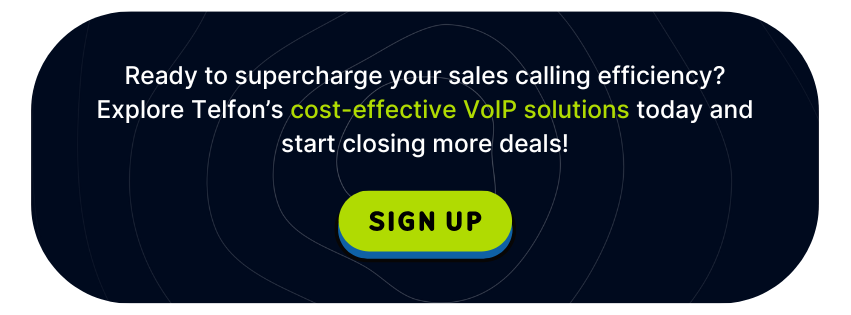
Conclusion
Enhancing sales calling efficiency is about more than increasing call volume. It’s about making smarter, more strategic, and more effective connections. By leveraging the capabilities of smart communication tools, particularly cloud-based virtual phone systems, businesses can significantly optimize their sales efforts across different geographical regions. These tools help reduce costs, overcome logistical hurdles like time zones and language barriers, and provide the data needed to continuously improve sales strategies.
A solution like Telfon, with its global reach, cost-effective pay-as-you-go pricing model, extensive features, and support for integrations, is an ideal choice for businesses aiming to scale their sales operations. By adopting the right technology and implementing best practices, your sales team can become more productive, engage prospects more effectively, and ultimately drive higher sales and revenue growth..


